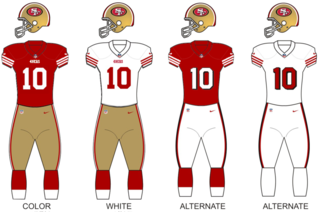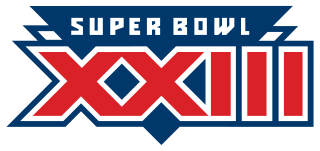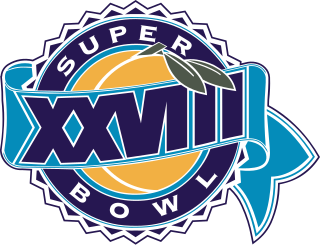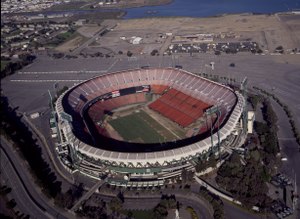
The San Francisco 49ers are a professional American football team based in the San Francisco Bay Area, California, United States. The 49ers compete in the National Football League (NFL) as a member of the league's National Football Conference (NFC) West division, and play their home games at Levi's Stadium in Santa Clara, California, located 38 miles (61 km) southeast of San Francisco. The team is named after the prospectors who arrived in Northern California in the 1849 Gold Rush.

Super Bowl XVI was an American football game between the National Football Conference (NFC) champion San Francisco 49ers and the American Football Conference (AFC) champion Cincinnati Bengals to decide the National Football League (NFL) champion for the 1981 season. The 49ers defeated the Bengals by the score of 26–21 to win their first Super Bowl.

Super Bowl XXIII was an American football game between the American Football Conference (AFC) champion Cincinnati Bengals and the National Football Conference (NFC) champion San Francisco 49ers to decide the National Football League (NFL) champion for the 1988 season. The 49ers defeated the Bengals 20–16, winning their third Super Bowl. The game was played on January 22, 1989, at Joe Robbie Stadium in Miami. This was the first Super Bowl hosted in the Miami area in 10 years, and the first in Miami not held at the Orange Bowl.

Super Bowl XXIV was an American football game between the National Football Conference (NFC) champion San Francisco 49ers and the American Football Conference (AFC) champion Denver Broncos to decide the National Football League (NFL) champion for the 1989 season. The game was played on January 28, 1990, at the Louisiana Superdome in New Orleans, Louisiana. The 49ers defeated the Broncos by the score of 55–10, winning their second consecutive Super Bowl, and then-tying the Pittsburgh Steelers with four Super Bowl victories. San Francisco also became the first team to win back-to-back Super Bowls with two different head coaches; rookie head coach George Seifert took over after Bill Walsh retired following the previous season's Super Bowl.

Super Bowl XXV was an American football game between the American Football Conference (AFC) champion Buffalo Bills and the National Football Conference (NFC) champion New York Giants to decide the National Football League (NFL) champion for the 1990 season. The Giants defeated the Bills by the score of 20–19, winning their second Super Bowl.

Super Bowl XXVI was an American football game between the National Football Conference (NFC) champion Washington Redskins and the American Football Conference (AFC) champion Buffalo Bills to decide the National Football League (NFL) champion for the 1991 season. The Redskins defeated the Bills by a score of 37–24, becoming the fourth team after the Pittsburgh Steelers, the now Las Vegas Raiders and the San Francisco 49ers to win three Super Bowls. The Bills became the third team, after the Minnesota Vikings and the Denver Broncos to lose back-to-back Super Bowls. The game was played on January 26, 1992, at the Hubert H. Humphrey Metrodome in Minneapolis, Minnesota, the first time the city played host to a Super Bowl.

Super Bowl XXVII was an American football game between the American Football Conference (AFC) champion Buffalo Bills and the National Football Conference (NFC) champion Dallas Cowboys to decide the National Football League (NFL) champion for the 1992 season. The Cowboys defeated the Bills by the score of 52–17, winning their third Super Bowl in team history, and their first one in 15 years. This game is tied with Super Bowl XXXVII as the fourth-highest scoring Super Bowl with 69 combined points, as of 2023. The Bills became the first team to lose three consecutive Super Bowls, and just the second of three teams to play in three straight. The following 1993 season, the Bills became the only team to both play and lose four consecutive Super Bowls. The game was played on January 31, 1993, at the Rose Bowl in Pasadena, California, and is the last NFL championship game to date to be held in a non-NFL stadium. It was also the seventh Super Bowl held in the Greater Los Angeles Area, which did not host another until Super Bowl LVI in 2022.

Super Bowl XXVIII was an American football game between the National Football Conference (NFC) champion Dallas Cowboys and the American Football Conference (AFC) champion Buffalo Bills to decide the National Football League (NFL) champion for the 1993 season. The Cowboys defeated the Bills, for the second straight year, by a score of 30–13, winning their fourth Super Bowl in team history, tying the Pittsburgh Steelers and the San Francisco 49ers for most Super Bowl wins. The Buffalo Bills became the only team to both play and lose four consecutive Super Bowls for a 0-4 franchise Super Bowl record, and as of 2023, remains the team's most recent Super Bowl appearance. The game was played on January 30, 1994, at the Georgia Dome in Atlanta. Since the 1993 regular season was conducted over 18 weeks, the traditional bye week between the conference championship games and the Super Bowl was not employed; the last time this had happened was before Super Bowl XXV.

Super Bowl XXIX was an American football game between the American Football Conference (AFC) champion San Diego Chargers and the National Football Conference (NFC) champion San Francisco 49ers to decide the National Football League (NFL) champion for the 1994 season. The 49ers defeated the Chargers by the score of 49–26, becoming the first team to win five Super Bowl championships. The game was played on January 29, 1995, at Joe Robbie Stadium in Miami, Florida.

Joseph Clifford Montana Jr. is an American former football quarterback who played in the National Football League (NFL) for 16 seasons, primarily with the San Francisco 49ers. Nicknamed "Joe Cool" and "the Comeback Kid", Montana is widely regarded as one of the greatest quarterbacks of all time. After winning a national championship at Notre Dame, Montana began his NFL career in 1979 at San Francisco, where he played for the next 14 seasons. With the 49ers, Montana started and won four Super Bowls and was the first player to be named the Super Bowl Most Valuable Player (MVP) three times. He also holds Super Bowl career records for most passes without an interception and the all-time highest passer rating of 127.8. In 1993, Montana was traded to the Kansas City Chiefs, where he played for his last two seasons and led the franchise to its first AFC Championship Game. Montana was inducted to the Pro Football Hall of Fame in 2000.
The National Football League playoffs for the 1993 season began on January 8, 1994. The postseason tournament concluded with the Dallas Cowboys defeating the Buffalo Bills in Super Bowl XXVIII, 30–13, on January 30, at the Georgia Dome in Atlanta, Georgia.
The National Football League playoffs for the 1992 season began on January 2, 1993. The postseason tournament concluded with the Dallas Cowboys defeating the Buffalo Bills in Super Bowl XXVII, 52–17, on January 31, at the Rose Bowl in Pasadena, California.

The National Football League playoffs for the 1988 season began on December 24, 1988. The postseason tournament concluded with the San Francisco 49ers defeating the Cincinnati Bengals in Super Bowl XXIII, 20–16, on January 22, 1989, at Joe Robbie Stadium in Miami, Florida.
The 1992 Buffalo Bills season was the 33rd season for the team in the National Football League (NFL). The Buffalo Bills entered the season as defending back to back AFC champions and finished the National Football League's 1992 season with a record of 11 wins and 5 losses, and finished second in the AFC East division. The Bills qualified for their third straight Super Bowl appearance, but lost to the Dallas Cowboys 52–17. This would be the only time the Bills did not finish first in the AFC Eastern Division from 1988 to 1993.

The 1994 season was the San Francisco 49ers' 45th in the National Football League (NFL), their 49th overall, and their sixth under head coach George Seifert. This season was highlighted by a victory in Super Bowl XXIX. The championship made San Francisco the first team to win five Super Bowls. After losing to the Dallas Cowboys in the previous two conference championship games, the 49ers made significant acquisitions in the 1994 free agent market. This included the signing of two-sport star Deion Sanders and Cowboys linebacker Ken Norton, Jr. Sanders had a major impact on the team's success, winning the NFL Defensive Player of the Year Award and recording six interceptions. The 49ers won their division, the NFC West, for the eighth time in nine seasons.

The 1989 season was the San Francisco 49ers' 40th in the National Football League (NFL), their 44th overall and their 1st season under head coach George Seifert. After going 14–2 in the regular season, the 49ers completed the season with one of the most dominant playoff runs of all time, outscoring opponents 126–26, earning their fourth Super Bowl victory and their second consecutive, where they defeated the Broncos, 55–10. They finished with the best record in the NFL for the first time since 1987. Their two losses were by a combined 5 points.

The 1992 San Francisco 49ers season was the franchise's 43rd season in the National Football League (NFL) and their 47th overall. The 49ers appeared in the NFC Championship Game for the second time in three seasons. This was the last season the 49ers had Joe Montana on the roster. The last game he played as a 49er was the December 28 Monday Night Football game against the Detroit Lions.
The 1988 Cincinnati Bengals season was the team's 21st year in professional football and its 19th with the National Football League (NFL).

The 49ers–Giants rivalry is an American football rivalry between the San Francisco 49ers and the New York Giants. It is one of the great inter-division rivalry games in the National Football League (NFL). The two teams do not play every year; instead, they play once every three years due to the NFL's rotating division schedules, or if the two teams finish in the same place in their respective divisions, they would play the ensuing season. Since 1982, the 49ers and Giants have met eight times in the postseason, tied for the most times two teams have met in the playoffs in the NFL since that time.

The 49ers–Packers rivalry is an American football rivalry between the San Francisco 49ers and the Green Bay Packers. The two teams do not play every year; instead, they play once every three years due to the NFL's rotating division schedules, or if the two teams finish in the same place in their respective divisions, they would play each other the following season. The rivalry became prominent during the 1990s, as the Brett Favre-led Packers defeated the Steve Young-led 49ers in three of four playoff meetings. In the 2005 NFL Draft, the 49ers selected Alex Smith with the first overall selection, passing on northern California native Aaron Rodgers; Green Bay later selected Rodgers with the 24th pick. Since Rodgers became the Packers' starter in 2008, the Packers and 49ers met in the playoffs four times, though the 49ers won all four of these meetings.













